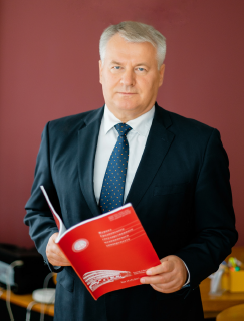СРАВНЕНИЕ МЕХАНИЗМОВ ДЕЙСТВИЯ АДЕНОЗИНА И АТФ В КОРОНАРНОМ РУСЛЕ ИЗОЛИРОВАННОГО СЕРДЦА МОРСКОЙ СВИНКИ

Аннотация
Исследованы механизмы коронарорасширяющего действия аденозина и АТФ в изолированном сердце морской свинки. Соединения вызывают дозозависимое увеличение коронарного потока. Коронарорасширяющий эффект аденозина и АТФ значительно уменьшается в присутствии ингибитора NO-синтазы метилового эфира L-NG-нитроаргинина (L-NAME, 10-4 М). Кроме того, коронарная вазодилатация под действием аденозина и АТФ ингибировалась антагонистом пуриновых Р1 (аденозиновых) рецепторов 8-сульфофенил-теофиллином (10-5 М). В то же время, антагонист пуриновых Р2 рецепторов сурамин (10-5 М) существенно не изменял коронарорасширяющий ответ на АТФ. Таким образом, как аденозин, так и АТФ обладают NO-зависимыми коронарорасширяющими свойствами в изолированном сердце морской свинки; коронарная вазодилатация под действием обоих соединений опосредована пуриновыми Р1 (аденозиновыми) рецепторами. Предположительно, действие АТФ может быть обусловлено быстрым дефосфорилированием его с образованием аденозина.Литература
Козловский В.И. Исследование механизма коронарорасширяющего эффекта карведилола в изолированном сердце морской свинки / В. И. Козловский, С. Хлопицкий, Р. Е. Грыглевский // Журнал Гродненского государственного медицинского университета. – 2005. - № 1. – С. 56 -60.
Belardinelli L., Shryock J.C., Snowdy S. Effects of adenosine and adenine nucleotides on the atrioventricular node of isolated guinea pig hearts // Circulation. – 1984. – Vol. 70, № 6. – P. 1083-1091.
Boo Y.C., Jo H. Flow-dependent regulation of endothelial nitric oxide synthase: role of protein kinases // Am. J. Physiol. Cell. Physiol. – 2003. – Vol. 285, № 3. – P. 499-508.
Cabell F., Weiss D.S., Price J.M. Inhibition of adenosine-induced coronary vasodilation by block of large-conductance Ca(2+)-activated K+ channels // Am. J. Physiol. – 1994. – Vol. 267. – P. 1455-1460.
Drury A.N., Szent-Gyorgyi A. The physiological activity of adenine compounds with special reference to their action upon mammalian heart // J Physiol. (Lond.). – 1929. – Vol. 68. – P. 213-237.
Hansmann G., Ihling C., Pieske B., Bьltmann R. Nucleotide-evoked relaxation of human coronary artery // Eur. J. Pharmacol. – 1998. – Vol. 359, № 1. – P. 59-67.
Heaps C.L., Bowles D.K. Gender-specific K(+)-channel contribution to adenosine-induced relaxation in coronary arterioles // J. Appl. Physiol. – 2002. – Vol. 92. – P. 550-558.
Hein T.W., Kuo L. cAMP-independent dilation of coronary arterioles to adenosine : role of nitric oxide, G proteins, and K(ATP) channels // Circ. Res. – 1999. – Vol. 85, № 7. – P. 634-642.
Keef K.D., Pasco J.S., Eckman D.M. Purinergic relaxation and hyperpolarization in guinea pig and rabbit coronary artery: role of the endothelium // J. Pharmacol. Exp. Ther. – 1992. – Vol. 260. – P. 592–600.
Kemp B.K., Cocks T.M. Adenosine mediates relaxation of human small resistance-like coronary arteries via A2B receptors // Br. J. Pharmacol. – 1999. – Vol. 126. – P. 1796–1800.
Korchazhkina O., Wright G., Exley C. Intravascular ATP and coronary vasodilation in the isolated working rat heart // Br. J. Pharmacol. – 1999. – Vol. 127, № 3. – P. 701–708.
Kroll K., Schrader J. Myocardial adenosine stimulates release of cyclic adenosine monophosphate from capillary endothelial cells in guinea pig heart // Pflugers Arch. – 1993. – Vol. 423, № 3-4. – P. 330–337.
Liu G.S., Thornton J., Van Winkle D.M. et al. Protection against infarction afforded by preconditioning is mediated by A1 adenosine receptors in rabbit heart // Circulation. – 1991. – Vol. 84. – P. 350–356.
Lynch F.M, Austin C., Heagerty A.M., Izzard A.S. Adenosine and hypoxic dilation of rat coronary small arteries: roles of the ATP-sensitive potassium channel, endothelium, and nitric oxide // Am. J. Physiol. Heart. Circ. Physiol. – 2006. – Vol. 290. – P. 1145–1150.
Matsumoto T., Nakane T., Chiba S. Pharmacological analysis of responses to ATP in the isolated and perfused canine coronary artery // Eur. J. Pharmacol. – 1997. – Vol. 334. – P. 173–180.
Minamino T., Kitakaze M., Asanuma H. et al. Endogenous adenosine inhibits P-selectin-dependent formation of coronary thrombi during hypoperfusion in dogs // J. Clin. Invest. - 1998. – Vol. 101. – P. 1643–1653.
Nakhostine N., Lamontagne D.Adenosine contributes to hypoxia-induced vasodilation through ATP-sensitive K+ channel activation // Am. J. Physiol. – 1993. – Vol. 265. – P. 1289–293.
Radenkovic M., Grbovic L., Pesic S., Stoiic D.Isolated rat inferior mesenteric artery response to adenosine: possible participation of Na+/K+-ATPase and potassium channels // Pharmacological/ Reports. – 2005. – Vol. 57. – P. 824–832.
Ralevic V., Burnstock G. Effects of purines and pyrimidines on the rat mesenteric arterial bed // Circ. Res. – 1991. – Vol. 69. – P. 1583–1590.
Ralevic V., Burnstock G. Receptors for purines and pyrimidines // Pharmacol. Rev. – 1998. – Vol. 50, № 3. – P. 413–492.
Rongen G.A., Smits P., Thien T. Characterization of ATP-induced vasodilation in the human forearm vascular bed // Circulation. – 1994. – Vol. 90, № 4. – P. 1891–1898.
Shah M.K., Bivalacqua T.J., Champion H.C., Kadowitz P.J. Vasodilator responses to ATP and UTP are cAMP dependent in the mesenteric vascular bed of the cat // J. Cardiovasc. Pharmacol. Ther. – 2001. – Vol. 6, № 3. – P. 287–295.
Yada T., Hiramatsu O., Tachibana H. et al. Role of NO and K(+)(ATP) channels in adenosine-induced vasodilation on in vivo canine subendocardial arterioles // Am. J. Physiol. – 1999. – Vol. 277. – P. 1931–1939.
Yegutkin G.G., Hentinen Y.,. Samburski S.S et al. The evidence for two opposite, ATP-generating and ATP-consuming, extracellular pathways on endothelial and lymphoid cells // Biochem. J. – 2002. – Vol. 367. – P. 121–128.
You J., Johnson T.D., Childres W.F., Bryan Jr. R.M. Endothelial-mediated dilations of rat middle cerebral arteries by ATP and ADP // Am. J. Physiol. – 1997. – Vol. 273. – P. 1472–1477.






























